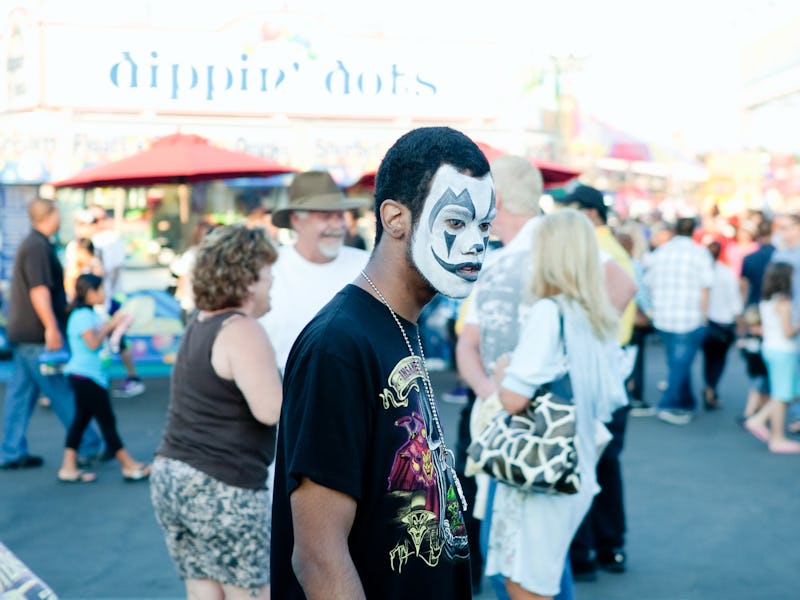Why There's a 'Juggalo March' on Washington, D.C.
The oft-misunderstood subculture is taking to D.C. over serious freedom of expression issues.

By and large, American authorities are not down with the clown. Fans of the Insane Clown Posse — commonly known as “Juggalos” — have been long-marginalized and targeted by law enforcement for their distinct brand of self-expression. And that’s exactly the reason thousands of hardcore Insane Clown Posse fans are marching on Washington, D.C., this weekend to clear their name.
Update: See photos from the Juggalo March
“The Juggalo Family must truly shine and show America and the world that we are not a gang, public menace, cult, or any of the other untrue labels they have attempted to slap on us throughout the years,” reads the Juggalos March website. “We must collectively show them that we truly are a family that is united by a shared love of music and fellowship.”
In 2011, the F.B.I. and Department of Justice determined that the Juggalo family (as members refer to themselves) could be classified as a [“loosely organized hybrid gang.]”(https://www.fbi.gov/stats-services/publications/2011-national-gang-threat-assessment) In the eyes of many Juggalos, it was a bizarre if not unsurprising designation. After all, being misunderstood in their idiosyncratic signifiers (like drinking gallons of Faygo soda and wearing clown-style face paint) was pretty much just par for the course. Violent J, who makes up one half of the hip hop duo, said that he tried to laugh it off at first. But it quickly became apparent that the stakes of this were too high to joke about.
Already marginalized and misunderstood by the general public, Juggalos came to face what they describe as systematic discrimination and profiling in the face of this determination. Juggalos with tattoos, clothing, or bumper stickers were being put on local and state lists of gang members and losing jobs, custody battles, and the opportunity to serve in the U.S. military. It was because of this that the American Civil Liberties Union took on the case against Juggalos as a first amendment violation and filed a lawsuit against the FBI. That suit and its ensuing appeals have since been repeatedly dismissed in court.
Violent J and Shaggy 2 Dope of Insane Clown Posse enlisted the help of the ACLU to fight the gang designation given to their fans.
To hear Juggalos tell it, the truth of the matter is that there’s nothing inherently dangerous about the subculture they belong to. Though they conjointly reject white supremacy (sample ICP lyric: “White pride for slavery it sickens my gut/I see [the confederate] flag as a challenge that you want to fight,”) they’re not even politically affiliated. On the whole, they’re just fans of a band that centers its image around theatrical violence, no more threatening than fans of staged professional wrestling or slasher films.
Juggalos have long served as a punchline, but the reality is that their marginalization speaks to much larger social issues in America. As Brian Raftery wrote for ‘Wired’ in 2010, “ICP’s following is made up mostly of young white men from working-class backgrounds. They tend to feel that they’ve been misunderstood outsiders their whole lives, whether for being overweight, looking weird, being poor, or even for just liking ICP in the first place.” This shared sense of other-ness can be a strong driver in fostering subculture, and journalists who have covered ICP in-depth typically acknowledge that it’s a founding principle of the Juggalo group identity.
In this way, the plight of the already-disenfranchised Juggalos who are now facing increased discrimination for simply trying to build community and empower themselves is especially unfortunate, and yes, worth marching for.